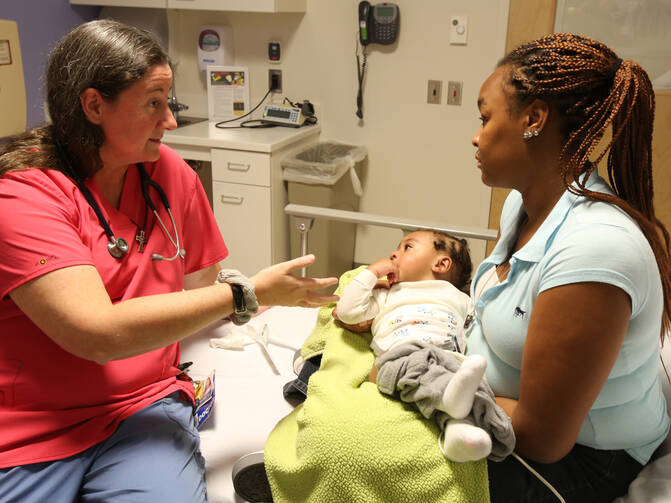There are a lot of dismissive attitudes toward poor people in American political discourse, but rarely are they expressed as bluntly as by Congressman Roger Marshall.
“Just like Jesus said, ‘The poor will always be with us,’” the Kansas representative remarked in a recent interview. “There is a group of people that just don’t want health care and aren’t going to take care of themselves.”
He elaborated: “Just, like, homeless people.… I think just morally, spiritually, socially, [some people] just don’t want health care. The Medicaid population, which is [on] a free credit card, as a group, do probably the least preventive medicine and taking care of themselves and eating healthy and exercising.”
It is difficult to tell what Dr. Marshall (an OB-GYN physician) means by “the Medicaid population.” Most people who qualify for Medicaid are pregnant women, children or disabled—all of whom tend to be more attentive when it comes to obtaining preventive care. Dr. Marshall may also be referring to poor people in general with this statement, but it seems disingenuous to complain about this population’s disinterest in preventive care and then argue that their access to preventive care through the Affordable Care Act be taken away.
I can understand how certain experiences in the medical profession might have shaped the congressman’s judgment. After all, any physician who works with patients on Medicaid will encounter people who wait too long to see a doctor. I have spent most of my career taking care of low-income patients, and it is my experience that they want health care and want to take care of themselves. People who do not take care of themselves inhabit every stratum of society—but it is the “Medicaid population” that faces more barriers to accessing care.
Poor patients might have difficulty finding a provider who will take Medicaid. They might not have a job with sick leave or family leave to take themselves or their children to the doctor. They might be living in a place where it is hard to find or store healthy foods. (I lived in the Sandtown neighborhood of West Baltimore for six years, and the produce within walking distance was overpriced and awful-tasting.) They might not have access to a gym to exercise. They might have experienced trauma in childhood, which has been proven to put them at higher risk of serious medical problems. They may have even lost their jobs because of health conditions—and only got back to work after they got health insurance through the A.C.A.’s Medicaid expansion.
“The poor you will always have with you” is not meant as a commentary on state welfare.
More troubling is Dr. Marshall’s invocation of “the poor you will always have with you.” This statement from Jesus is not meant as a commentary on state welfare. It is a rebuke to those who would use “what about the poor?” as an argument against doing beautiful things to honor Christ while he is with them. In fact, the full quotation from Deuteronomy that Jesus is citing here goes on to say that because there will always be poor people in the land, the Israelites should always be generous and open-handed with their neighbors.
Health care is not a right like the right to life, but it is not a free-market commodity like soda. It is a social good that must be distributed justly in order to ensure American citizens do not needlessly suffer from preventable or treatable diseases. We can and should debate the wisdom of various approaches to ensuring that every American has the health care they need to survive and thrive. (I wrote about one such approach here.) However, at least when it comes to preventive care like vaccines and basic screenings, any approach other than the government directly paying for these basic services would be inefficient and unjust.
There are real concerns with helping poor people take care of themselves; giving everyone health insurance is not enough to get everyone eating healthier and exercising. If we want to change these things and cultivate the virtues that allow people to take care of themselves, we have to create communities where these virtues are shared. If there are moral, spiritual, or social deficits among us, cutting welfare programs while shouting at people from a distance to pull themselves up by their bootstraps will not fix these shortcomings. It will take love and sacrifice to bear the costs of healing us all.
The A.C.A. is not perfect, and more needs to be done in order to reform health care in the United States. But toxic attitudes towards the poor will not help. Rather, we need to think about how the government can ensure everyone gets the basic care they need and to create an environment where institutions like hospitals, churches and families can thrive and cultivate the virtues that allow us to care for one another.











“Just like Jesus said, ‘The poor will always be with us,’”
And so we see that:
Just as men and women of Virtue find rich succor in Scripture,
so also do the degenerate, the depraved, the dissolute.
Thus, like Lolita,
Scripture may be pimped by those who, of whatever character, might gain from it.
Scripture must never be guide to civic policy.
Rather, civic policy must be guided by Virtue, Reason and shared brotherhood.
Matthew, I agree with everything you say, except the final sentence. The ninth word in that sentence is "government." I think the word should be "church." It is our responsibility to care for every other human being, including helping them with health care. When we shirk that responsibility and turn it over to a civil government, we get what we have now. What if we stepped out in faith as a church and said: "hey, we'll provide health care for the needy?" I'm confident God would work miracles that we don't dare even dream. But other than that, great article. Thank you for your thoughts.
Jesus' statement about the poor always being with us was to motivate us to care for them, to help them out of poverty. But we humans have cleverly, even diabolically, turned his words around to justify our not caring for the poor.
And the pope has reminded us that in our world of billions of people, private charity will never be enough. Organized, consistent government programs are needed. For example, when it comes to nutrition, 95% of food for the poor in America comes from government programs, according to econ prof Charles Clark at St. John's U in NY.
We are also told many times in scripture to judge not. The same scripture has also told us many times to meet others needs before we satisfy our wants.
Beautifully expressed, Jim.
Thank you.
Jim I agree we have abused Jesus' statement about the poor. But Jesus also fed a bunch of people with 5 loaves of bread and a couple of fish. I believe he'd continue doing that if we were willing to give some of our own bread and fish. Turning 95% of our responsibility to the government doesn't seem right to me. For now, praise God the government is doing that much. I'd just like to see what would happen if Jesus' church (and I'm talking about us individually and corporately) would give in faith and expect miracles. I think we can do more than we are. Thanks for sharing. Good thoughts.
What an incredibly crass and mistaken view of the poor, disabled, homeless and/or unemployed. How can one possibly read scripture and conclude the poor must be abandoned and left on their own? Who are we to judge what is needed and how badly or how generous we should be in attending to those wants and needs. The congressman just needs to come and spend a few days at our food pantry, at a community clinic, with a volunteer group of dentists seeing young children. His attitude will change 180 degrees.
Using Scripture to justify neglect of the poor and weak is sinful. I feel sorry for patients of a doctor like Roger Marshall.
Some aspects of the healthcare industry are seldom mentioned. One is that it is less expensive to provide everyone healthcare and focus on preventive health maintenance than to provide the crisis management that our system focuses on.
An aspect I have never read about, but have observed over decades of working intermittently in healthcare, is that the industry grew up with the baby boomers. If we did no surgeries except those available when I started working in my mid-teens in 1970, we would do only outpatient surgeries. Modern healthcare was developed as baby boomers began working and it enjoyed the benefits of having a young, healthy population paying for a relatively small group of older and ill people. Hospitals, doctors, insurance companies and healthcare-related services could charge whatever they wanted, and the costs could be easily absorbed.
The essential problem now is that everyone in the overpaid healthcare industry is getting kicked off the gravy train and they feel abused. Single-payer, universal coverage for healthcare is the least expensive and most effective solution, but it won't pay for million dollar salaries for executives and doctor's salaries of several hundred thousand dollars annually. Surgery is the big revenue center in a hospital. People will not have elective surgery if they have a big deductible to pay, and a single-payer system won't pay doctors or hospitals a lot of money. High-deductible insurance plans or single payer (Medicare) is the future of the healthcare industry, but no one wants to look at that honestly.
I significantly disagree with Dr. Loftus’ following statement:
“Health care is not a right like the right to life, but it is not a free-market commodity like soda. It is a social good that must be distributed justly in order to ensure American citizens do not needlessly suffer from preventable or treatable diseases.”
I believe that it is a right, like the right to life. In fact, I believe it is a derivative right that makes the right to life meaningful. Dr. Loftus speaks here of “…preventable or treatable diseases.” Earlier in his piece he mentions that many Medicaid recipients are disabled, the victims of conditions neither preventable nor treatable but only manageable.
Here in the USA we leave the economic burdens to the parents of disabled children to deal out their care; as adults we leave it to either family members or nursing/longterm care homes. If as a society we demand governmental pro-life philosophy, policies and practices, then it is indeed the duty of the government to provide for the healthcare and management of life of all to fulfill its pro-life character. The specifics can be debated and decided.
Congressman Marshall’s comments were unChristian. Dr. Loftus’ piece was both on target and necessary, and I thank him for it. However, he needs to accept the next progression…health care is a right for all human beings, one that our government must provide and our taxes underwrite. Whether people choose to exercise that right or not is their free will option. It is not because Christ told us that the poor will always be with us.
...a beautiful comment, Vincent.
Thank you.
While making a lot of money is not in itself a sin, it frequently reveals where a person is "coming from" in their ideology-driven politics. Kansas Congressman Marshall has multiple salaries amounting to over $838,000 per year. He has assets of of up to $10,800,000 earning annually up to $3,900,000. Earnings per year are thus up to $4.7 million. These are all reported by the Clerk of the House of Representative from the Congressman's financial disclosure filed in 2015 and viewable at:
http://clerk.house.gov/public_disc/financial-pdfs/2015/10005765.pdf
It is easier for a Mercedes to fit through the eye of a needle than for a millionaire to understand what it is like to be poor or living check to check or in a service job making less than $30,000 per year, or laid off, or unemployed, or too sick to work. It is a lot easier to be "virtuous" when you're comfortable and secure, easier to be righteous when you're sitting in the driver's seat.